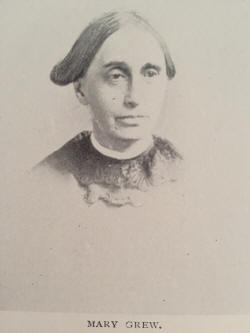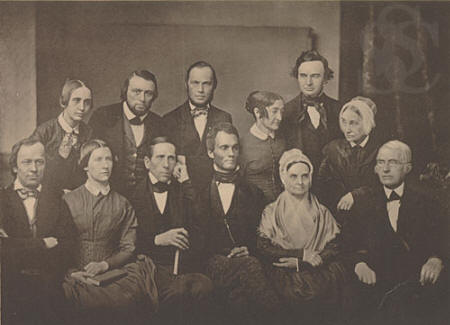

Partner Margaret Burleigh
Queer Places:
116 N 11th St, Philadelphia, PA 19107
2044 Mt Vernon St, Philadelphia, PA 19130
Woodlands Cemetery
Philadelphia, Philadelphia County, Pennsylvania, USA
 Mary
Grew (September 1, 1813 - October 10, 1896) was a Pennsylvania abolitionist
and suffragist. Her longtime companion was
Margaret Burleigh.
Mary
Grew (September 1, 1813 - October 10, 1896) was a Pennsylvania abolitionist
and suffragist. Her longtime companion was
Margaret Burleigh.
She was born and reared in Hartford, Conn. Her father, the Rev. Henry Crew (1781-1882), was a native of Birmingham, England, who had come to the United States with his parents in 1795; her mother, Kate Merrow of Hartford, was the third of his four wives. Mary was the fifth of her father's six children, the elder of the two by this marriage. One of her cousins, Ann Terry Greene, married the abolitionist Wendell Phillips. Mary Crew attended the Hartford Female Seminary (in which her father was a stockholder) during the years when it was directed by Catharine Beecher. As a young girl she taught a Sunday school class for Negro children. Though her father was pastor of the First Baptist Church of Hartford from 1807 to 1811, the family seems to have lived mainly on investments, and both she and her father devoted their lives largely to social reform movements.
After a brief residence in Boston the family settled in Philadelphia in 1834. There Mary joined the newly organized Female Anti-Slavery Society, in which she worked closely with Lucretia Mott and Sarah Pugh; she was the society's corresponding secretary until it disbanded in 1870. Through its yearly fairs this group raised a substantial portion of the funds which sustained the operations of the Pennsylvania Anti-Slavery Society (1837-70), a branch of the American Anti-Slavery Society. The Pennsylvanians generally followed the lead of William Lloyd Garrison after the abolitionist split of 1840, advocating equal rights for women as well as for Negroes. Mary Crew, who became a warm friend of the Garrison family, was frequently elected to the executive committee of the state society, took an active part in its meetings, and served for a time as co-editor of the Pennsylvania Freeman, the society's weekly organ. She also worked in the Free Produce Association, which sought to boycott slave-grown products, and in the American Peace Society.

A photograph of the Executive Board of the Pennsylvania Antislavery Society taken in 1851. Standing, from left to right, are Mary Grew, E. M. Davis, Haworth Wetherald, Abby Kimber, J. Miller McKim, and Sarah Pugh. Seated, from left to right, are Oliver Johnson, Mrs. Margaret
Jones Burleigh, Benjamin C. Bacon, Robert Purvis, Lucretia Mott, and James Mott.
She lent her voice as well as her pen to the antislavery cause. One of the small hand of pioneers who broke the taboos against women addressing mixed assemblies, she was an effective speaker, despite her small stature and plain appearance. She played an important role in the Anti-Slavery Convention of Ameri-can Women that met in Pennsylvania Hall on May 17, 1838, surrounded by a hostile mob which ransacked and burned the building that evening. She was a delegate to the World's Anti-Slavery Convention which met in London In 1840, where she found herself, along with other female delegates, excluded from the convention floor. (Her father, also a delegate, was among those who opposed admission of women.)
As it did with her fellow delegates Lucretia Mott and Elizabeth Cady Stanton, the London episode helped turn Mary Crew's interests in the direction of woman's rights. Despite her father's opposition to this cause, she circulated petitions in support of a married women's property law, which was passed by the Pennsylvania legislature in 1848. She served on the business committees of the national woman's rights conventions held in 1854 and 1860 and spoke at the latter. When the Pennsylvania Woman Suffrage Association was founded in 1889, she was elected president. Within the national movement, which split that year into two factions, she sided with the American Woman Suffrage Association of Lucy Stone and Julia Ward Howe and was its president in 1887. The Pennsylvania group conducted a fruitless campaign to have woman suffrage provisions included in the new state constitution adopted in 1873. Mary Crew continued as president of the state association for twenty-three years, until 1892, when, at the age of seventy-nine, she resigned and was succeeded by Lucretia Longshore Blankenburg.
Miss Grew was one of the founders, with Eliza Sproat Turner, of the New Century Club of Philadelphia, an important early woman's club, established in 1877 as an outgrowth of the previous year's Centennial Exposition. Active as a lecturer until the last year of her life, she was occasionally invited to preach in Unitarian and other liberal pulpits; she had herself become a regular attendant at Philadelphia's First Unitarian Church. Of an affectionate nature, she liked children and had "a large store of humor." She never married, but lived for many years with a close friend, Margaret Burleigh. She died at her home in Philadelphia at the age of eighty-three and was buried in that city's Woodlands Cemetery. An obituary tribute by Henry Blackwell described her as "quiet and unpretentious" and of singular gentleness and simplicity" (Woman'a Journal, Oct. 17, 1898). She was the subject of a poem by John Greenleaf Whittier (1871) which closed with the lines: The way to make the world anew Is lust to grow—as Mary Grew!
My published books: